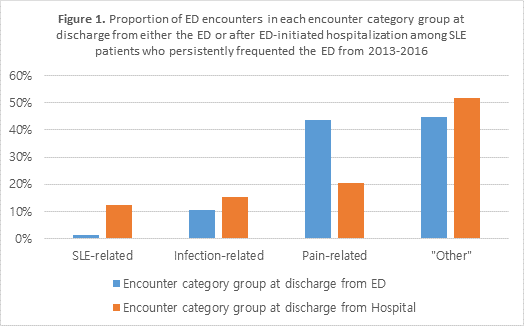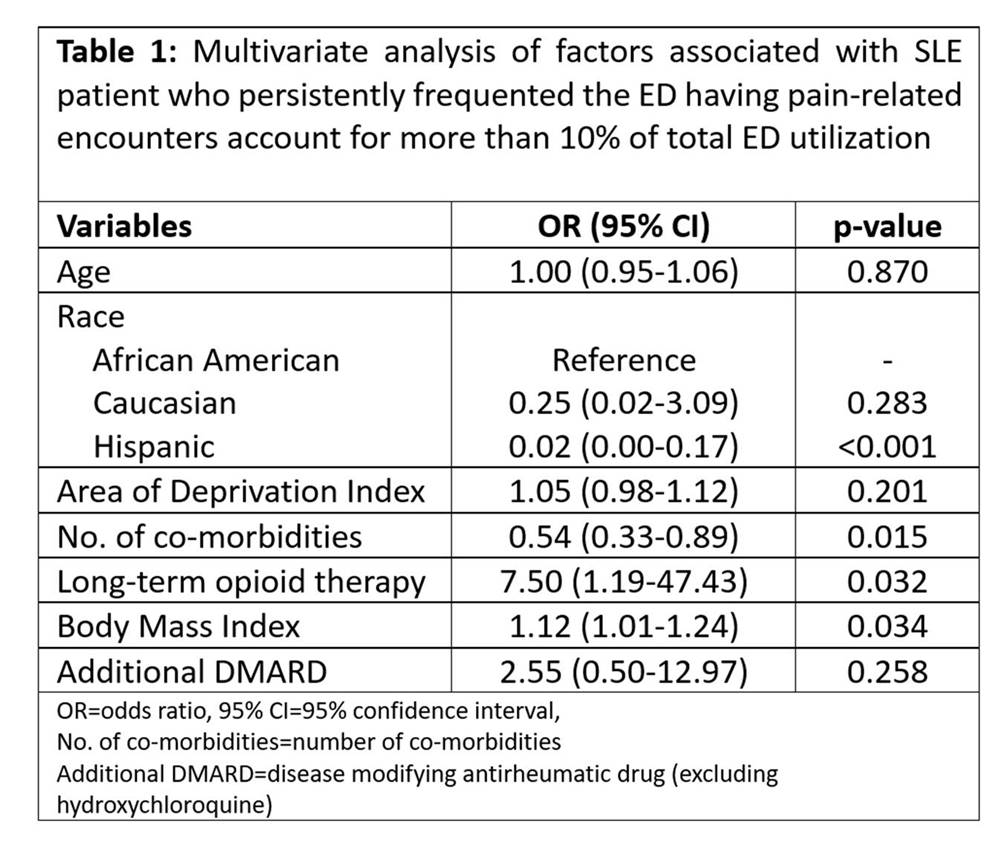Session Information
Date: Wednesday, November 8, 2017
Title: Health Services Research II: Methods and Technology in Care and Research
Session Type: ACR Concurrent Abstract Session
Session Time: 9:00AM-10:30AM
Background/Purpose: SLE patients frequently utilize the ED irrespective of their access to care, which raises concern for inadequate quality of care in the outpatient setting. In the general population, previous studies have shown that most high-utilizers only use the ED frequently for a brief period of time (<12 months), however, a subgroup continue to use the ED persistently over years. We sought to investigate the characteristics and patterns of healthcare resource utilization among SLE patients who persistently frequent the ED in order to identify opportunities to improve outpatient care.
Methods: We identified SLE patients who persistently frequented the ED from 2013-2016. Persistent use was defined as having 3 or more ED visits during the 12 months in a calendar year, for at least 2 out of the 4 years, consecutive or non-consecutive, during the study period. Patient demographics, general health status, SLE history, long-term opioid therapy (LOT), encounter specific information and disposition were collected through retrospective electronic health record review. Each ED encounter was categorized into the following groups; SLE-, infection-, pain-related, or other. We used multivariate logistic regression to evaluate patient characteristics associated with each encounter category group. Variables with p-value <0.1 in univariate analysis were included in the multivariate model.
Results: Seventy-seven SLE patients having 1143 encounters were identified as persistently frequent ED users. Most were female (91%) and had SLE for longer than 10 years (54%). The mean age was 42 (SD 15), and 69% were African American, 14% were Caucasian, and 17% were Hispanic. All had some form of insurance with 49% having Medicaid as their primary insurance. Approximately one third had diagnosis of depression (31%) and 38% were on LOT. Most were on hydroxychloroquine (77%) and/or an additional disease modifying rheumatic drug (51%). Of all ED encounters, 32% were pain-related (Figure 1), and of these most were either discharged from the ED (69%) or within 48 hours of admission (20%). In multivariate analysis, SLE patients with pain-related encounters accounting for >10% of ED use were more likely to be obese, have more comorbid conditions, and be on LOT (Table 1).
Conclusion: Pain is major cause of ED use among SLE patients, and associated with LOT. SLE patients who utilize the ED for pain are more likely to be non-critically ill, as evidenced by frequent discharges from the ED and short stay admissions. Thus, SLE patients who persistently frequent the ED for pain may represent a viable target for interventions to improve outpatient care and care co-ordination.
To cite this abstract in AMA style:
Lee J, Suter LG, Fraenkel L. Persistently Frequent Emergency Department (ED) Utilization Among Systemic Lupus Erythematosus (SLE) Patients [abstract]. Arthritis Rheumatol. 2017; 69 (suppl 10). https://acrabstracts.org/abstract/persistently-frequent-emergency-department-ed-utilization-among-systemic-lupus-erythematosus-sle-patients/. Accessed .« Back to 2017 ACR/ARHP Annual Meeting
ACR Meeting Abstracts - https://acrabstracts.org/abstract/persistently-frequent-emergency-department-ed-utilization-among-systemic-lupus-erythematosus-sle-patients/


